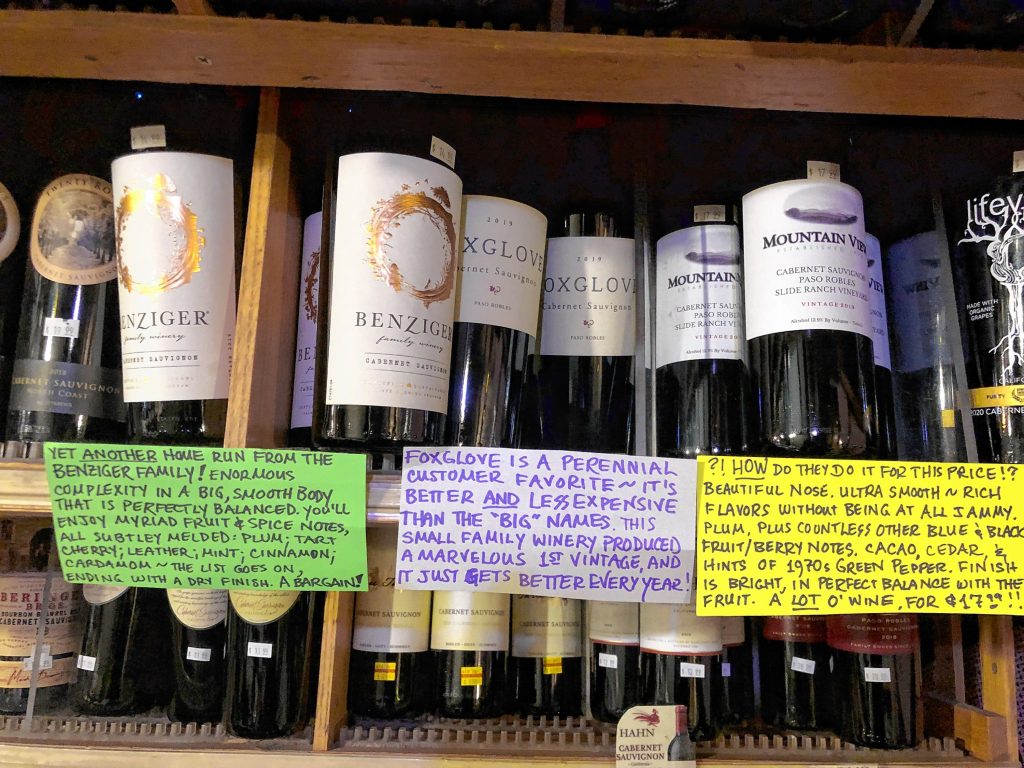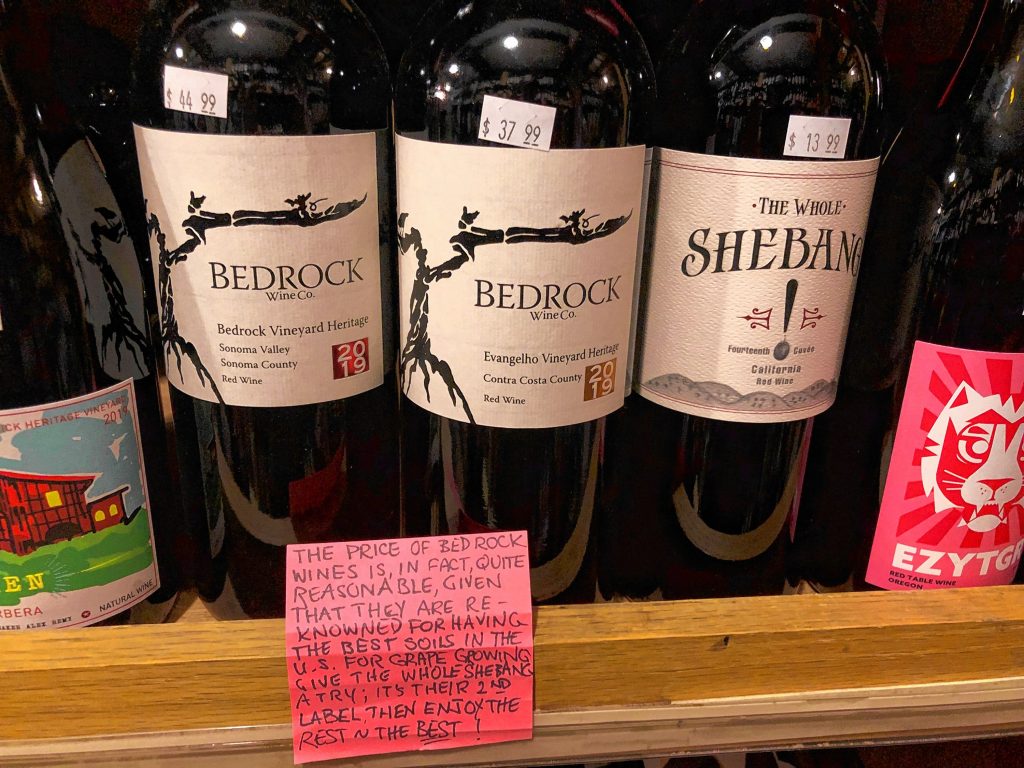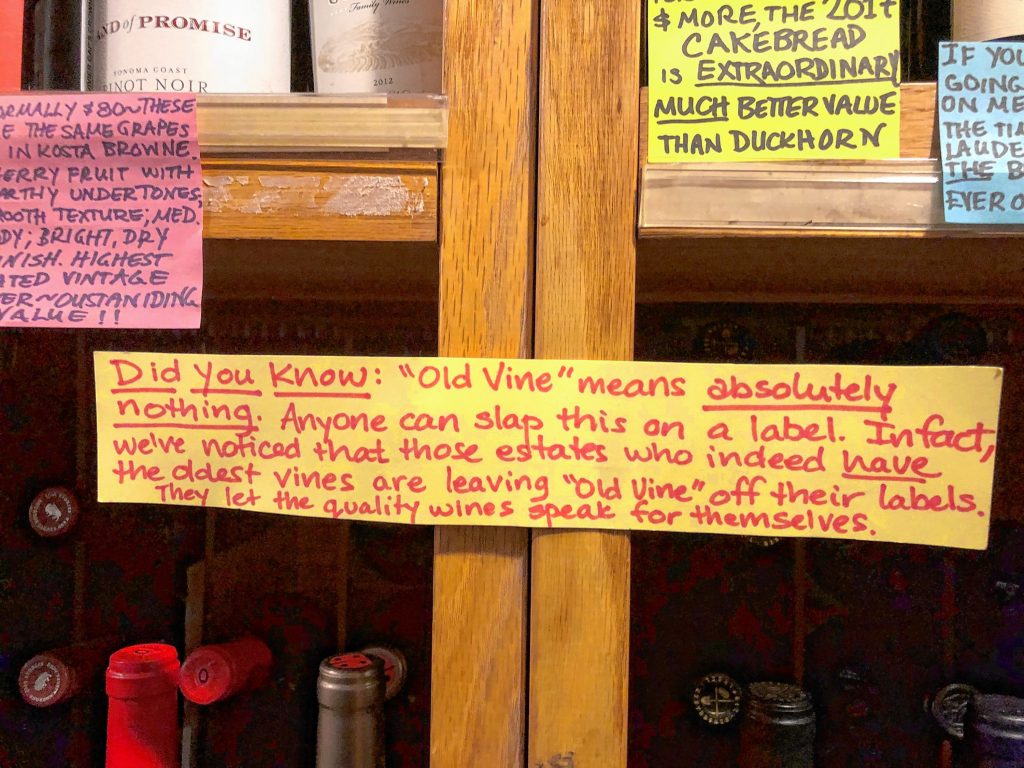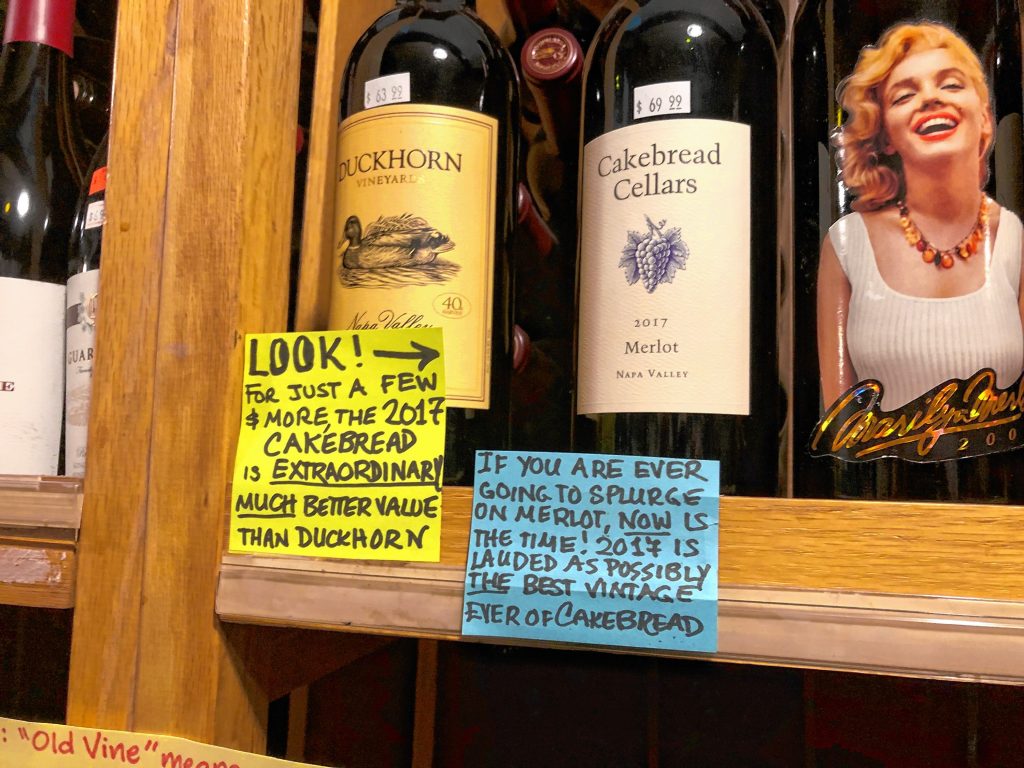Don’t believe everything you read. As a matter of fact, stop reading this right now or you could be subject to the persuasion of the published word. However, if you find comfort or guidance from others’ opinions, especially when it comes to wine, read on.
When you walk into a wine shop and amble down the aisles, there are frequently small, glossy placards placed beneath some of the bottles gracing the shelves. Those placards may have some information about where the wine is from, what grapes are in the bottle, and perhaps a score — usually a score no lower than the high 80s on a 100-point scale.
Also included on the cards are flowery, hyperbolic descriptions of the wine in the bottle. These descriptions are often fodder for parody when poking fun at wine snob lingo. These placards are commonly referred to as “shelf talkers.” They are pieces of propaganda, created by the distributor or the winery as a way to draw your attention to the product they are trying to push. One actual shelf talker from a wine company called Crazy Beautiful Wines, reads “Aromas of wet earth, strawberry, hazelnut, and white pepper tones. An off-dry wine with a pinch of tannins on the back end, this wine delivers strawberry, and cranberry flavors, and closes on a nice floral finish.” Can such high-falutin wine snob lingo be trusted?
Rob Swan from Ruby Wines and Spirits Inc., a wholesaler based in Massachusetts, believes that a well thought out shelf talker can be helpful to anyone trying to make a decision on their wine purchase. Ruby Rob says, “Wine store employees aren’t always able to help if you have questions.” And when it comes to the scores you see on the shelf talkers, Ruby Rob says it may be worth figuring out whose scores reflect your tastes. “I would find a wine pundit or two that you trust,” he says, “like Wine Spectator, or James Suckling. Try the wines that they highly rate and see if you agree. You may not always like a wine that someone else has rated but at least you can trust that these wine pundits are professional tasters and are looking at wines in an objective way.” I often question how objective these pundits in publication are. Does the full-page ad your company pulled in Wine Spectator factor into how high your Spectator score may climb? Maybe I’m too cynical. The shelf talkers that I find most interesting are the ones written by the staff in the shop. And nowhere I’ve been has more fun with handwritten shelf talkers than Four Seasons Wine and Spirits on Route 9 in Hadley.
Sharon Swihart is the one at Four Seasons who writes the shelf talkers. They don’t look pretty. They don’t look glossy. They are handwritten on Post-It notes and plunked underneath her wine selections. Below a bottle of a $64 Duckhorn Napa Valley Cabernet is a handwritten shelf talker that reads “LOOK! For just a few $ more, the 2017 CAKEBREAD is EXTRAORDINARY. MUCH better value than Duckhorn.” This is the kind of shelf talker I can take to heart. It might as well read “Don’t buy this particular bottle, which is clearly available to purchase from this very store. Buy THAT one, even if it is a teeny bit more.” Swihart says, “My overall philosophy is to be as honest as possible with customers. Brutally honest, in fact. And that is reflected in our shelf talkers.” Despite the fact that this particular shelf talker is suggesting you pay a little bit more, Swihart says the overall philosophy that drives her to bust out the magic marker and Post-It notes is “Spend less, drink better.”
Why trust the store’s wine buyer over what the industry itself sends out as marketing material? Swihart says, “With very few exceptions, I taste every wine prior to ordering. Each must taste better than its price to earn a spot on our shelves. Most of the shelf talkers are straight-forward tasting notes.”
While some of the bigger name brands, which Four Seasons still carry, pour tons of money into marketing, Sharon and her Post-It notes act as a guerilla-marketing campaign against the (Rex) Goliaths of the wine world. Swihart says, “We specialize in smaller family wineries, which offer better value than the big names. I’m not shy about telling customers that they are making a mistake with those ‘big name’ wines.” She says those shelf talkers direct customers away from the big names with the “spend less, drink better” admonition. Once they do try the alternatives, Swihart says, “our customers move overwhelmingly in their favor.”
Swihart also likes to use her shelf talkers for simple wine education. One example reads: “Rosés are NOT sweet, and are not related to blush wines. Rosés, in fact, can be some of the driest wines produced.” Swihart says that in recent years, the public have made major strides in their understanding of rosé. It’s now a style of wine people pursue all year long, rather than in just the spring and summer, which is when they drank it in decades past. “Rosés are SO lovely,” she says, “I’m proud to be part of the movement to create understanding of and popularity for this segment.”
Another helpful handwritten Swihart shelf talker instructs the reader on how to avoid misleading language on the labels: “Did you know: ‘Old Vine’ means absolutely nothing? Anyone can slap this on a label. In fact, we’ve noticed that those estates who indeed have the oldest vines are leaving ‘Old Vine’ off their labels. They let the quality wines speak for themselves.”
Swihart takes the time to hand-make these shelf talkers to, as she says, “gain trust by telling the truth ALWAYS.” While customers are often skeptical of her descriptions, Swihart says the vast majority come back to thank her for changing their perspective. However, Swihart is aware that sometimes her store carries both the big name brands that may be overpriced, and the scrappy small companies she recommends in their stead. And she knows that could have an impact on the store’s bottom line. She seemed eager to talk (off the record) about a well-known and overpriced Champagne house she’d like to throw under the bus. But she doesn’t want Four Seasons owner, Sean Barry, to lose his shirt. “However true it, in fact, is!”
Writing her truth on a Post-It note ultimately builds trust with the customers. “Spend less, drink better,” Swihart says, “I do everything I can to help our customers save money, whatever their budget.” I, for one, am a fan of her Post-it note candor. Maybe sometimes you can believe what you read.






